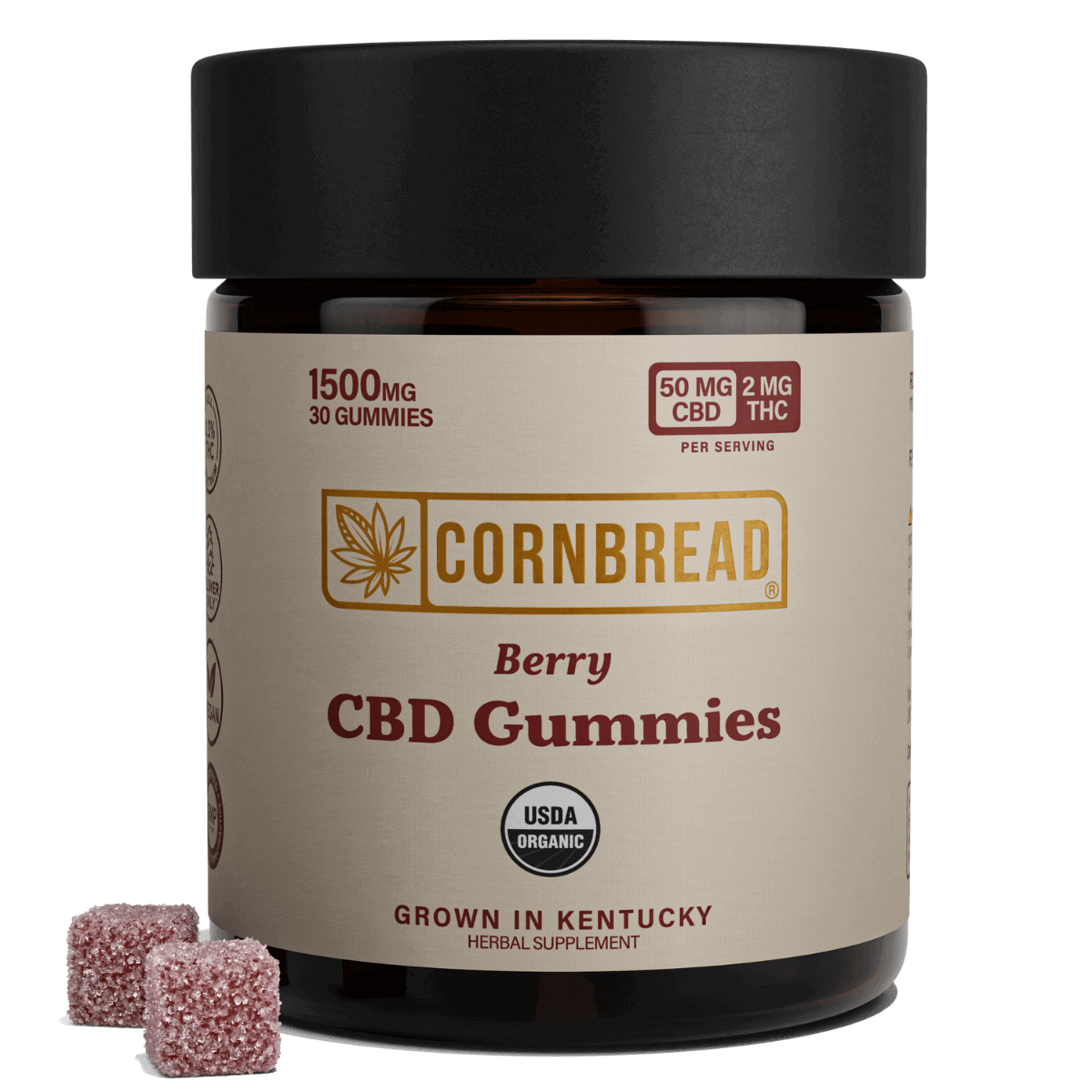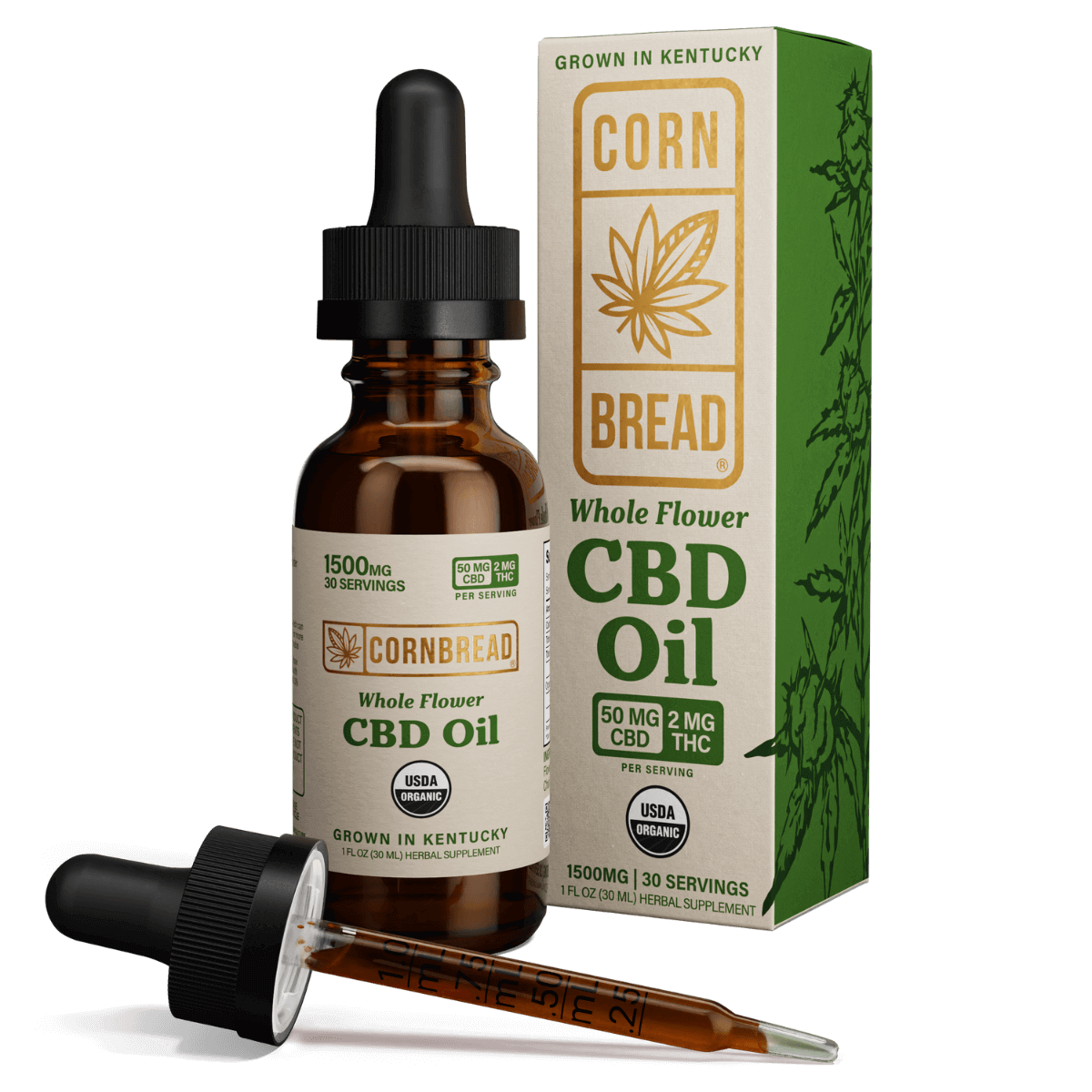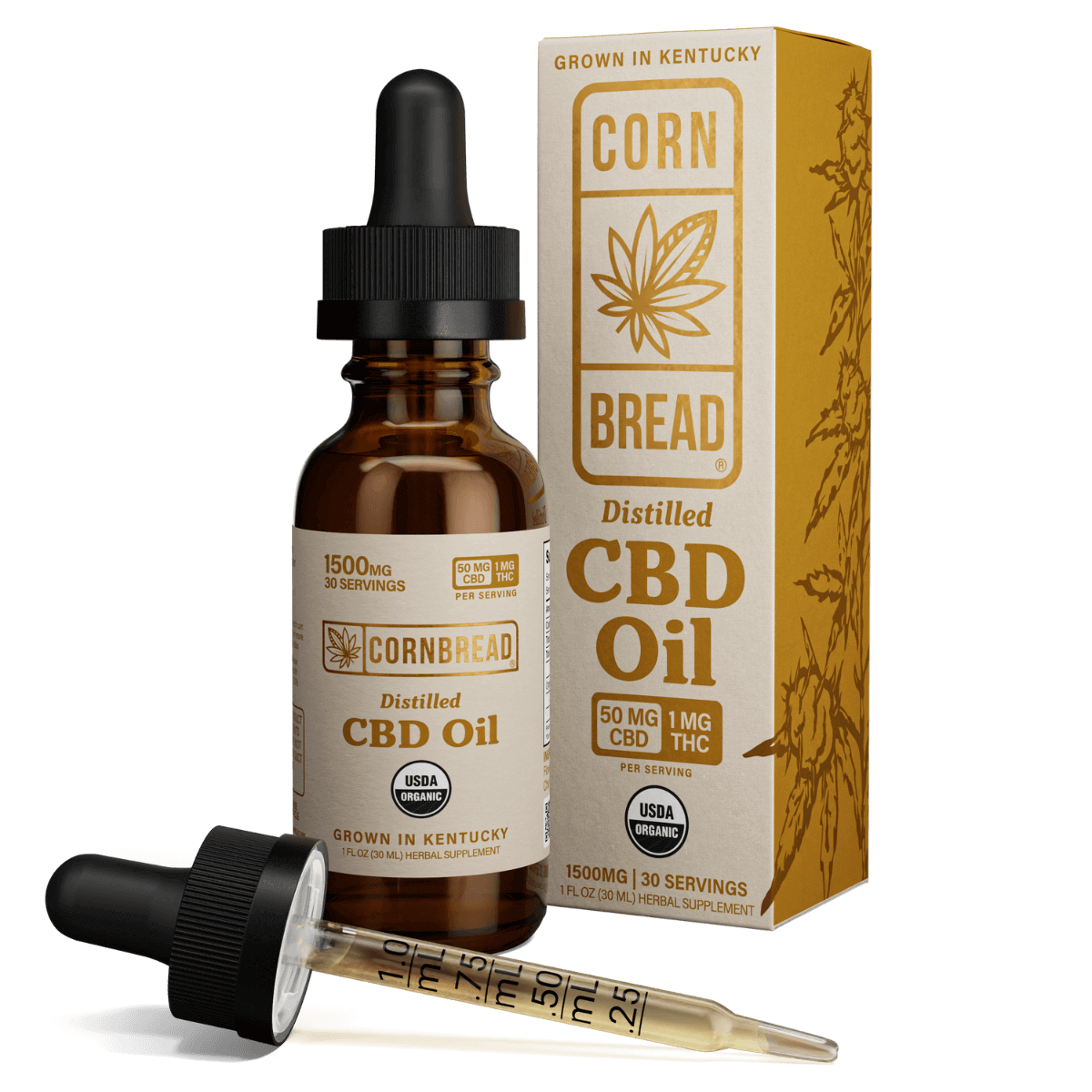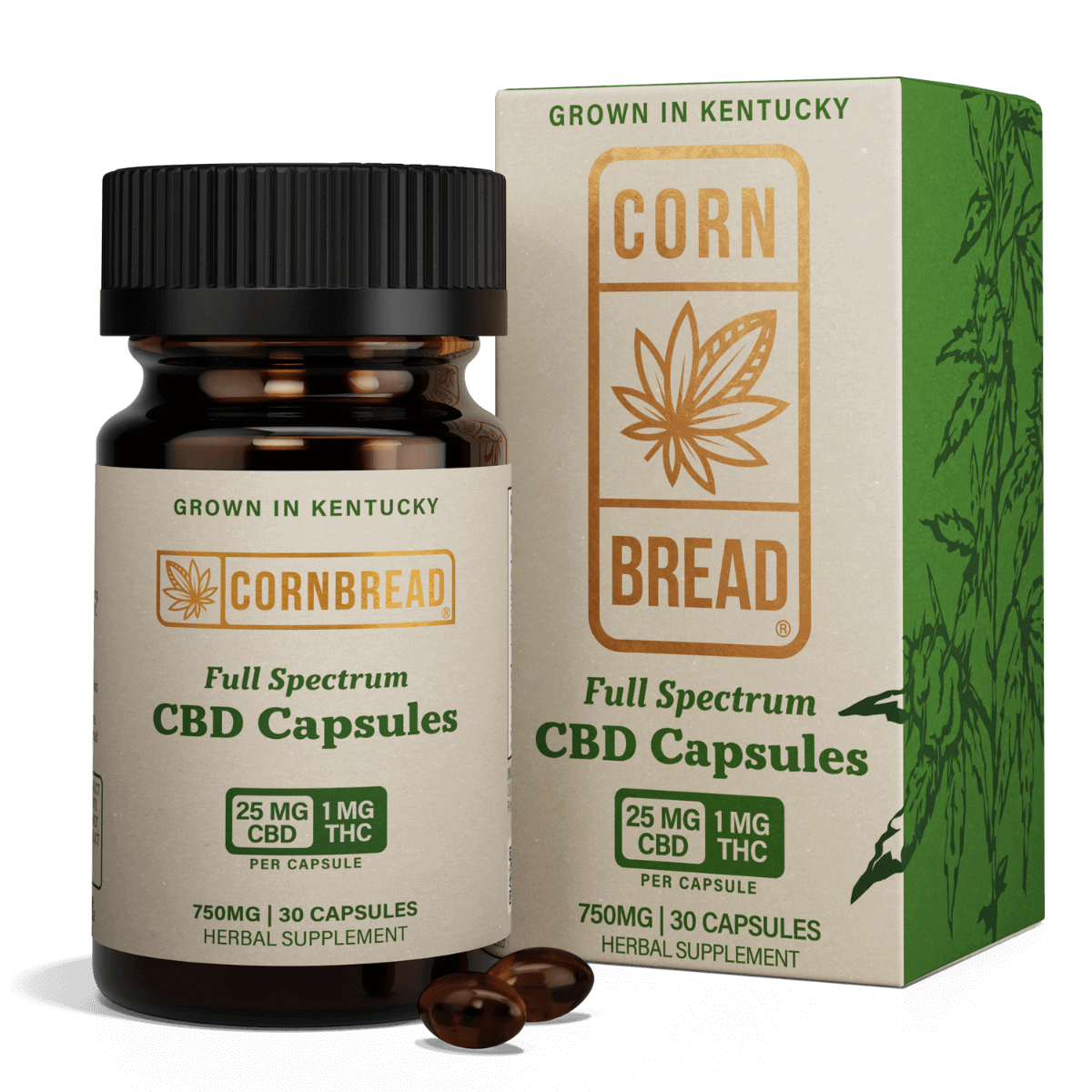Table of Contents
- Introduction
- How Does Being “High” Feel?
- Does CBD Have Psychoactive Effects?
- The Cannabis Sativa Plant: Hemp vs. Recreational Marijuana
- How Do THC and CBD Interact With the Body?
- Types of CBD Products
- Types of Cannabinoids That WILL Get You High
- Full Spectrum CBD and the Entourage Effect
- Is CBD Legal?
- CBD and Drug Tests
- What Makes CBD Special?
- Does CBD Have Side Effects?
- High-Quality CBD Products That Won't Get You High
- Full Spectrum CBD From Cornbread Hemp
Introduction
CBD (a.k.a. cannabidiol) is a popular wellness ingredient found in nearly every type of product — from oils, tinctures, and gummies to shampoos, lotions, and salves — and it's only been growing in popularity. Among other things, CBD has been found to improve sleep and mood, and to reduce everyday stress. It's a natural option that's generally regarded as safe … and it comes from cannabis plants.
That last fact is what brings us to the topic of this article. If CBD comes from cannabis, you might be wondering, does CBD get you high?
The short answer is that CBD, itself, won't get you high. But it can have positive effects on mood, which could leave some — unfamiliar with the "high" feeling — wondering if that's what they're experiencing.
But there's more to it than that. Let's take a closer look at whether or not CBD gets you high, what being "high" actually feels like, and more.
How Does Being “High” Feel?
"High" is a term used to explain an elevated feeling brought about by the use of certain drugs or substances.
In the case of marijuana, when a person gets high, they typically feel relaxed and euphoric and their perceptions become altered in some way. Many people report a heightened awareness of their senses — with sounds and colors possibly appearing more intense. Their sense of time can also be distorted.
Some people tend to feel introverted when they're high, while others may get a creative spark or simply feel "giggly."
For some, being high on marijuana can be an uncomfortable experience. They might feel paranoid or anxious, especially in the case of inexperienced users or those taking higher doses.
Common physical reactions include increased heart rate and dry mouth. Short-term memory can also be affected by marijuana use, which is why some people choose not to get high.
But what is it about marijuana that makes you feel high? The culprit is a natural cannabis compound called tetrahydrocannabinol aka THC.
Does CBD Have Psychoactive Effects?
In simple terms, Merriam-Webster defines “psychoactive”1 as "affecting the mind or behavior." As CBD has the potential therapeutic benefit of improving mood, it could technically be considered psychoactive. However, this isn’t usually what people are thinking of when they ask if a substance is psychoactive.
The term "psychoactive" is more often used to describe drugs or substances that act on a person's central nervous system, thereby altering their behavior, mood, mental processes, or consciousness.
Psychoactive drugs, as a category, can encompass a variety of substances from stimulants and depressants to hallucinogens. A good example is THC — the primary cannabis compound (or cannabinoid) found in marijuana, and well-known for its high-inducing psychoactive effects.
The Cannabis Sativa Plant: Hemp vs. Recreational Marijuana
You may have heard the terms "hemp," "marijuana," and "cannabis" used interchangeably, but they're not the same thing. At least, not anymore.
The Agriculture Improvement Act of 2018, also known as the 2018 Farm Bill,2 made the cultivation of hemp legal. It achieved this by distinguishing hemp from the more strictly regulated marijuana based on THC content.
-
Hemp: A cannabis plant that contains 0.3% THC or less.
-
Marijuana: A cannabis plant that contains greater than 0.3% THC.
So, hemp and marijuana are both varieties of the cannabis sativa plant, with one main difference — their THC content.
Since the federal government only placed restrictions on THC, and not the 100+ other cannabinoids present in cannabis sativa, cannabis cultivators began cross-breeding different plant strains to reduce THC levels and increase CBD content.
While all cannabis plants contain a full spectrum of cannabinoids (including both THC and CBD), the type of cannabis we call “marijuana" produces predominant amounts of THC, and the type we call "hemp" contains mostly CBD. Otherwise, a hemp plant looks and smells the same as a marijuana plant. The only difference is the amount of THC it contains, and the only way to truly tell the difference between hemp and marijuana is through chemical analysis.
How Do THC and CBD Interact With the Body?
So, CBD is the main cannabinoid in hemp, and is used as the main ingredient in a plethora of wellness products. CBD has the potential to improve mood, sleep, and provide relief from everyday stress. But how does CBD work? It works by interacting with a particular system in the body — the endocannabinoid system.
The Cannabis Plant and the Endocannabinoid System
THC and CBD are cannabis compounds — specifically, cannabinoids. So, what are endocannabinoids and what is the endocannabinoid system?
“Endo-“ is a Greek prefix that means “from within, or inside.” So, an “endocannabinoid” is a cannabinoid produced naturally within the body. "Phyto-" means "relating to plants. “The cannabinoids found in cannabis sativa are "phytocannabinoids." When endocannabinoids were discovered, they were found to be similar to phytocannabinoids, which is how they got their name.
The endocannabinoid system (or ECS) is an extensive network of cannabinoid receptors, enzymes, and endocannabinoids — all working together to maintain homeostasis (overall balance) throughout the body's many systems.
-
ECS Receptors
ECS receptors are found in the central and peripheral nervous systems, the gut, and throughout nearly every other system in the body. These receptors interact with endocannabinoids and phytocannabinoids (like CBD and THC), to produce various reactions within the body. The ECS has two types of cannabinoid receptors: CB1 and CB2. -
ECS Enzymes
Enzymes within the ECS have two functions: controlling the production of endocannabinoids and breaking down cannabinoids (both endo- and phyto-) after they've interacted with ECS receptors.
Understanding the endocannabinoid system is key to understanding how and why CBD and THC affect the body differently — namely, why THC produces a “high” sensation and CBD doesn't.
THC and the ECS: How Does THC Get You High?
THC is the principal cannabinoid responsible for the psychoactive effects of cannabis, and it works by activating the endocannabinoid system’s CB1 receptors.
CB1 receptors mostly reside in the brain, brain stem, and elsewhere in the central nervous system. By binding to receptors in the brain, THC from recreational marijuana produces the feelings associated with “getting high,” such as euphoria, laughter, and distortions of the senses.
CBD and the ECS: Does CBD Get You High?
As mentioned earlier, CBD is technically psychoactive because of its ability to improve mood, but the effects from CBD are not at all like being high from THC-rich marijuana.
As far as how CBD works within the ECS, it doesn't appear to bond to CB1 receptors like THC does (further explaining why CBD won't get you high). Instead, it's believed that CBD prevents the enzymes from breaking down other endo- and phytocannabinoids, allowing those cannabinoids to interact with receptors longer, and thus produce greater beneficial effects.
In fact, CBD's effect on the way THC binds with ECS receptors seems to mitigate the psychoactive effects of THC. This has led to the conclusion that CBD can bring you back to "middle" rather than make you "high." Does this mean CBD can reduce the “high” effect of THC? Possibly. And this corresponds with what we understand about CBD helping the body restore balance.
In short, CBD on its own cannot get you high.
However, you may have seen CBD products in stores that also contain THC. So, can those make you high? Let's take a look at the different types of CBD on the market and see.
Types of CBD Products
There are three main types of CBD products on the market and these differ based on their particular cannabinoid content.
Full spectrum CBD
Full spectrum CBD contains CBD as well as a variety of other cannabis compounds — terpenes and flavonoids (responsible for the flavor and color of the hemp plant) and other cannabinoids. Full spectrum products do contain THC, but no more than 0.3%.
Can CBD get you high when it’s full spectrum? No. The amount of THC present in hemp-derived full spectrum CBD products is far too low to produce a "high" effect.
Broad spectrum CBD
Broad spectrum CBD also contains a variety of cannabis compounds. However, the THC has been removed so that it’s undetectable.
Does broad spectrum CBD get you high? Nope. With even less THC than full spectrum CBD, broad spectrum cannot get you high..
CBD Isolate
CBD isolate is pure CBD that contains no other cannabinoids or cannabis compounds.
Can you get high from CBD isolate? Still, that’s a no. CBD isolate contains absolutely no THC, so it won’t produce a high sensation.
Each variety of CBD listed above is available as a CBD oil. And if you're wondering "Does CBD oil get you high?" The answer is the same. Whether CBD oil is full spectrum, broad spectrum, or made with CBD isolate, it will not get you high.
Types of Cannabinoids That WILL Get You High
So if CBD won’t get you high, what cannabis products will? Watch out for psychoactive effects in the following compounds:
Delta-9 THC (Delta-9 Tetrahydrocannabinol): Commonly found in marijuana in varying concentrations, Delta-9 THC is the main psychoactive compound in the cannabis sativa plant.
Delta-8 THC (Delta-8 Tetrahydrocannabinol): Derived from hemp, Delta-8 THC is a variant of THC similar in structure to Delta-9 with generally milder psychoactive effects.
THCA (Tetrahydrocannabinolic Acid): The precursor to THC, THCA doesn't have psychoactive effects in its raw form, but when it's exposed to heat through smoking or vaping, it converts into THC, producing psychoactive effects.
THCV (Tetrahydrocannabivarin): THCV is a cannabinoid that may have psychoactive properties, but its effects vary from person to person.
Full Spectrum CBD and the Entourage Effect
Full spectrum hemp-derived CBD products contain no more than 0.3% THC. Many CBD companies only sell broad spectrum or CBD isolate products, which contain undetectable amounts of THC or none at all. However, full spectrum CBD is considered to be the most effective variety, offering the greatest potential benefits.
Now, why is that?
Research suggests that without THC, even the small amount found in full spectrum products, the therapeutic potential of CBD products are limited.3 However, with THC, the possible benefits are amplified. This is because of a reaction known as the "entourage effect." Basically, CBD taken concurrently with THC (even a very small amount of THC) appears to produce greater effects than when taken alone.
Out of the three types of CBD listed in the section above, full spectrum CBD is the only one that can bring about the entourage effect.
Is CBD Legal?
Let’s take a closer look at the legalities.
While THC-rich marijuana remains a Schedule 1 restricted substance, hemp and hemp-derived CBD products containing no more than 0.3% THC are federally legal in all of the United States, including Puerto Rico, the U.S. Virgin Islands, and Guam.
However, some states have placed their own restrictions on CBD.4 In Idaho, for example, CBD oil is legal as long as it contains no detectable amounts of THC. If you're worried about it, just check your local state laws before starting a CBD regimen.
CBD and Drug Tests
Though hemp-derived CBD is legal on a federal level, the majority of drug tests being administered today are unable to differentiate between THC that comes from legal hemp-derived CBD and THC that comes from illegal marijuana.
Does that mean you should just stick with broad spectrum CBD and CBD isolate products? Not exactly.
While THC-free products might seem like a safer bet than full spectrum CBD oils, your workplace may use a drug test that can't tell the difference between THC metabolites (the result of metabolizing THC) and other cannabinoid content (like CBD metabolites). So there’s a chance you could test positive on a drug test even if you use a THC-free CBD product.
If you think you might be subjected to workplace drug testing, check out our article "Does CBD Show Up on a Drug Test?" for more information on the topic.
What Makes CBD Special?
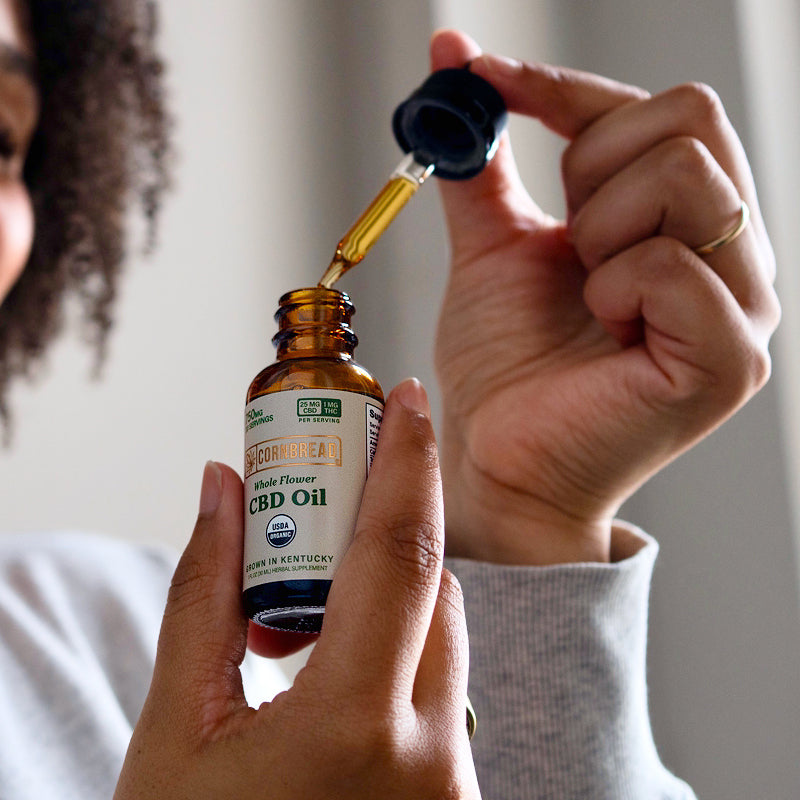
A good CBD supplement added to your wellness routine can help to support your body's general function and bring about an overall balance.
Benefits of CBD
-
CBD has the potential to reduce everyday stress and improve mood.
-
CBD can help to relieve aches and pains caused by exercise-induced inflammation.
-
CBD can also support good sleep and help with occasional sleeplessness.
As stress, mood, and sleep play such important roles in overall quality of life, it's easy to see why adding a high-quality CBD supplement to your daily routine can make such a difference.
Does CBD Have Side Effects?
According to preliminary research and anecdotal reports, some people may experience minor negative side effects from CBD.
Most often, side effects occur when one consumes more than the recommended dose of CBD, and sometimes these side effects result from other ingredients within the CBD product and not the CBD itself.
The potential side effects from CBD include:
-
Drowsiness: Although for many people who take CBD products, drowsiness is a benefit, not a drawback, some find drowsiness to be a negative side effect — especially if they feel drowsy in the morning after waking.
-
Gastrointestinal Issues: No one likes gastrointestinal issues, but typically these are caused by ingesting more than the recommended dose of CBD. Some people may experience diarrhea and other intestinal discomfort, but sometimes it's actually the carrier oil (coconut oil, hemp seed oil, etc.) that upsets the stomach.
-
Dry Mouth: A well-known side effect of smoking marijuana is dry mouth and, for some people, ingesting CBD products may produce a similar effect.
-
Prescription Drug Interactions: CBD can affect how the liver metabolizes medications since it’s also metabolized in the liver. If you're on prescription medications, check with your doctor before you begin a CBD regimen.
-
Allergic Reactions: In very rare cases, a person can be allergic to hemp products. If you happen to experience a bad reaction to CBD, consult your healthcare provider.
High-Quality CBD Products That Won't Get You High

If you're looking to start a CBD regimen but you're concerned about getting high, the most important thing you can do is make sure you're choosing a high-quality supplement. This ensures you get all the potential wellness benefits while staying within the legal standards with regard to THC content.
As the CBD industry is still relatively new, sufficient regulation is lacking. It's all too common to find CBD products with cannabinoid content that doesn't match the label. This means you could end up with a CBD oil that has less or more CBD than advertised, is tainted with contaminants like heavy metals, or contains illegal levels of THC.
Thanks to its effectiveness, full spectrum CBD oil is one of the most popular CBD products available. But there are a lot of full spectrum CBD oils out there, and they're far from equal, so it's important to know what to look for when you're doing your shopping.
-
Organic Hemp
First off, it's important to seek out products made from organic hemp. The hemp plant is known for absorbing contaminants such as heavy metals, pesticides, and other toxins out of the soil in which it's grown. These harmful substances will ultimately compromise the purity and safety of the final CBD product, which can lead to unwanted side effects or health issues. By consuming CBD from organically grown hemp plants, you can avoid this risk. -
Certificates of Analysis (COA)
Trustworthy CBD companies will offer certificates of analysis (COAs) on their website, and sometimes on the products themselves. These contain detailed results of lab tests confirming the cannabinoid content and, ideally, ensuring the absence of pesticides, solvents, mycotoxins, heavy metals, and microbial contaminants. Before purchasing a new CBD supplement, you should always review the product's COA. -
Third Party Lab Reports
One of the easiest ways to distinguish between a reputable and a sketchy CBD manufacturer is whether or not the company utilizes third-party lab testing for their CBD supplements. This transparency ensures you're buying a product that is effective, safe, and legal.
By doing your due diligence to make sure you're buying from a credible company that uses organic hemp, conducts third-party testing, and provides COAs, you can be confident you're incorporating high-quality full-spectrum CBD oil into your wellness routine. This is the best way to maximize the potential health benefits CBD has to offer while staying compliant with CBD's legal guidelines, and avoiding the "high."
Full Spectrum CBD From Cornbread Hemp
Cornbread Hemp CBD supplements are made with the highest-quality Flower-OnlyTM extract from USDA certified organic hemp.
We understand how important it is for you to do your own research when choosing a wellness supplement. This is why we employ third-party lab tests to confirm the exact cannabinoid content of all of our products. and screen for pesticides, heavy metals, microbials, mycotoxins (from fungi), and residual solvents. Our lab reports are available on our website.
You can rest assured that any Cornbread Hemp CBD supplement will be free from harmful contaminants, and the THC content won't exceed the federal legal limit of 0.3 percent — just enough to produce the "entourage effect" and maximize the potential benefits of your CBD, but not enough to get you high.
Shop Cornbread Hemp Full Spectrum CBD Oil and check out our other full spectrum CBD supplements now.










 Log in
Log in
















